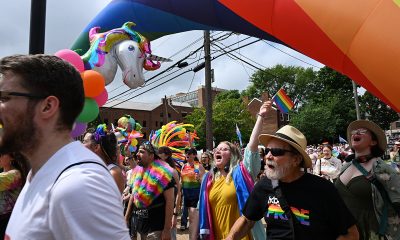Local
Danica Roem takes office in Va. Senate
2024 legislative session began in Richmond, Annapolis on Wednesday
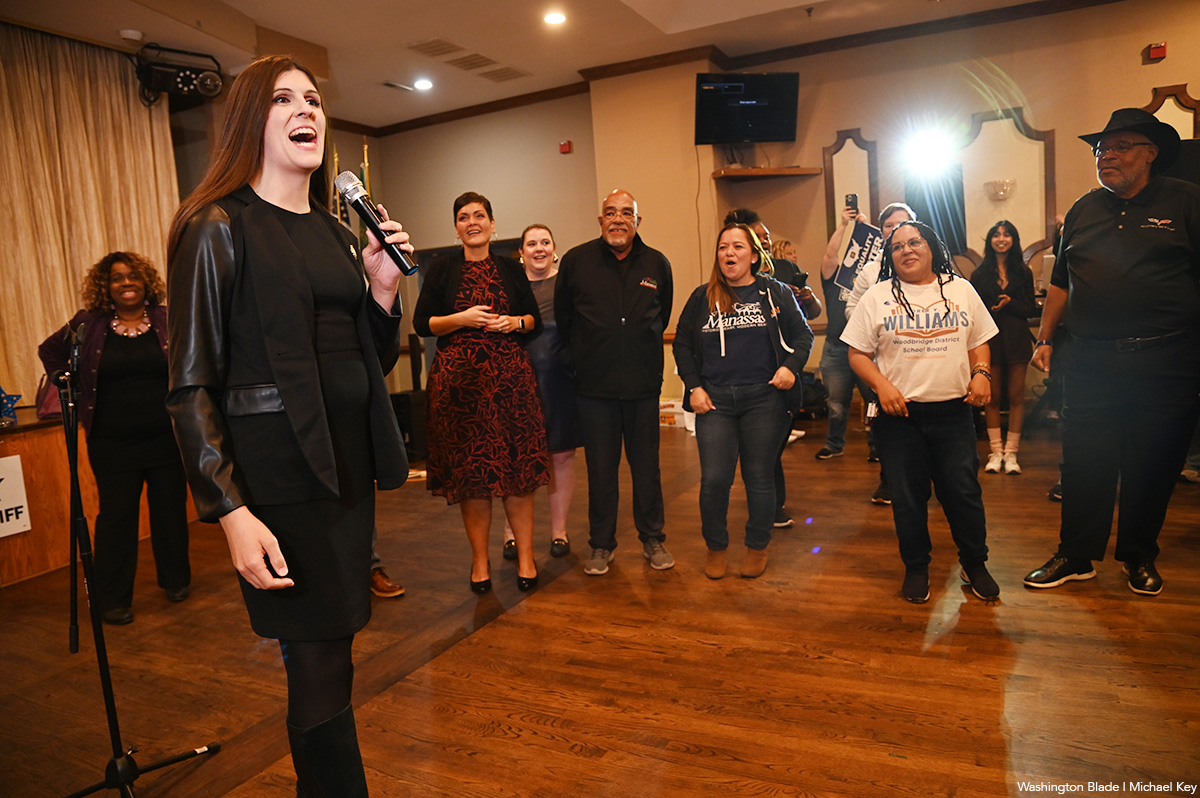
State Sen. Danica Roem (D-Manassas) on Wednesday became the first transgender person seated in the Virginia Senate.
The Manassas Democrat last November defeated Republican Bill Woolf to represent the 30th Senate District. Roem in 2018 became the first trans person seated in a state legislature in the country when she assumed her seat in the Virginia House of Delegates.
“The voters have shown they want a leader who will prioritize fixing roads, feeding kids and protecting our land instead of stigmatizing trans kids or taking away your civil rights,” said Roem after she defeated Woolf.
Democrats last November regained control of the House of Delegates. They have a 21-19 majority in the state Senate. Republican Gov. Glenn Youngkin will remain in office until his term ends in 2025.
State Dels. Rozia Henson (D-Prince William County), Laura Jane Cohen (D-Fairfax County) and Adele McClure (D-Arlington County) took office on Wednesday. They are gay, bisexual and queer respectively. State Del. Joshua Cole (D-Fredericksburg), a bisexual man who was in the House of Delegates from 2020-2022, returned to Richmond on Wednesday.
House Speaker Don Scott (D-Portsmouth) is the first Black House of Delegates speaker.
State Sen. Adam Ebbin (D-Alexandria) and state Del. Mark Sickles (D-Fairfax County), who are both gay, won re-election last November. State Dels. Kelly Convirs-Fowler (D-Virginia Beach) and Marcia “Cia” Price (D-Newport News), who are bisexual and pansexual respectively, returned to the House of Delegates.
Ebbin and Sickles have introduced resolutions in their respective chambers that seek to repeal a state constitutional amendment that defines marriage as between a man and a woman. Ebbin and Henzon have also sponsored bills that would reaffirm marriage equality in Virginia.
Voters approved the Marshall-Newman Amendment in 2006.
Same-sex couples have been able to legally marry in Virginia since 2014.
The General Assembly in 2021 approved a resolution that seeks to repeal the Marshall-Newman Amendment. It must pass in two successive legislatures before it can go to the ballot.
The state Senate last year approved Ebbin’s resolution that sought to repeal the marriage amendment. Senators in 2023 also passed the gay Alexandria Democrat’s marriage equality affirmation bill.
A House of Delegates subcommittee last year tabled the resolution. State delegates also did not consider the marriage equality affirmation bill before the 2023 legislative session ended.
“Virginians want a chance to remove the noxious marriage language that was added to our constitution in 2006,” said Sickles in a press release.
The marriage equality resolutions and bills are among Equality Virginia’s 2024 legislative priorities.
Roem on Tuesday noted to the Washington Blade during a telephone interview that Republican lawmakers have once again introduced anti-LGBTQ bills. These include a measure to ban trans athletes from school sports teams that correspond with their gender identity.
“Those bills died last year,” said Roem. “The patrons of those bills lost their election.”
“They learned nothing from the election,” she added.
Md. General Assembly’s 2024 legislative session begins
The Maryland General Assembly’s 2024 legislative session also began on Wednesday.
FreeState Justice in a press release notes the organization this year is “working with our partners in government and advocates across the state to remove statutes that stigmatize and criminalize HIV, to codify protections for gender affirming care and to respond to a recent state Supreme Court decision that weakened our anti-discrimination protections.”
“We will fight against harmful rhetoric and mean-spirited bills targeting LGBTQ+ youth and students,” said FreeState Justice. “We are collaborating with advocates and government officials to secure real oversight and other reforms for our criminal justice system. We’re working to make vital documents more trans-inclusive, advocating for healthcare access and affordability, urging state leaders to push their federal counterparts to publish the Equal Rights Amendment, and seeking necessary updates to pay practices for the benefit of workers.”
State Del. Gabriel Acevero (D-Montgomery County) has reintroduced a bill that would create a Commission on History, Culture and Civics in Education. The Montgomery County Democrat on Wednesday told the Blade the commissioners would represent African American, Latino, LGBTQ, Indigenous, Asian American and Pacific Islander communities.
“Their responsibility is to essentially look at our school curriculum, figure out how it can be more inclusive and teaching of the various histories of all these groups,” he said.
State Del. Ashanti Martínez (D-Prince George’s County) has introduced a bill that would explicitly ban discrimination based on sexual orientation and gender identity in insurance and credit lending in Maryland.
“We have federal protections that are already in place, but it’s always good to have state level protections, especially with what potentially can happen on the national level with the Trump presidency,” Martínez told the Blade on Wednesday. “We want to make sure that our communities are protected here in Maryland, no matter who’s in the White House.”
This year’s legislative session began weeks after Meghan Lewis, a trans woman, was killed outside her Bel Air home. FreeState Justice in its press release notes it supports “efforts to keep our communities safe by reducing gun violence, stepping up enforcement against hate crimes, and expanding victims’ access to emergency shelter and other resources.”
“The General Assembly has an excellent opportunity to continue its work uplifting Maryland’s LGBTQ+ community during this legislative session,” said Phillip Westry, the group’s executive director.
Maryland
Silver Spring holds annual Pride In The Plaza
‘Today means inclusion. It means to build resilience’

Silver Spring’s annual Pride in the Plaza event took place on Sunday to celebrate the LGBTQ community and emphasize inclusion and resilience.
“Today means inclusion. It means to build resilience, love,” Robyn Woods, program and outreach director for Live In Your Truth, which organized the event, said. “I mean, just being surrounded by the community and so many great entrepreneurs, business owners, and just being a part of this whole rainbow coalition that we call the LGBTQIA to be about.”
With the event being her first time organizing for Live In Your Truth, Woods said she felt emotional to see the support and love at the event.
“Some people (are) bringing out their children, their babies, their grandparents,” Woods said. “It’s a lot more allies here than anything else. That type of support to me means so much more than just support from my community; just outside support, inside support, so much support around it, so much love. Everyone’s smiling outside, helping each other.”
Attendees of the event were able to head over to the Family Fun Zone, an air-conditioned Pride Cool Down Lounge, or watch live drag performances in the main stage area.
Along with entertainment and a shaved-ice stand, rows of information tables stood along the plaza, including FreeState Justice, the Washington Spirit, Trans Maryland, Moco Pride Center, and the Heartwood Program, an organization that offers support, therapy, education, and resources to the LGBTQ community.
“I want people to know about our services, and I love what we have to offer,” Jessica Simon, psychotherapist for Heartwood Program’s Gender Wellness Clinic, said. “I (also) want to be part of a celebration with the community, and so it feels good to be here with other people who have something they want to give to the community.”
She added that within today’s political climate, to which she called an “antidote to shame,” it’s important to be celebrating Pride.
“There’s a lot of demonization of LGBTQI people,” Siena Iacuvazzi, facilitator for Maryland Trans Unity, said. “(Pride) is part of the healing process.”
Iacuvazzi said she was taught to be ashamed of who she was growing up, but being a part of a community helped her flourish in the future.
“I was taught how to hate myself. I was taught that I was an abomination to God,” she said. “But being a community is like understanding that there are people who have experienced the same thing, and they’re flourishing. They’re flourishing because they’re willing to stand up for themselves as human beings and discover themselves and understand what’s true for themselves.”
She added that Pride allows for a mutual understanding to take place.
“It’s more of a sense of belonging … and just taking that home and understanding you’re not alone,” Iacuvazzi said. “We’re each taking our own journey — we’re not putting that on each other. It’s just walking away with a sense of belonging and humanity.”
Similar to Iacuvazzi, Woods said she hopes attendees’ biggest takeaways would be family, fun, resilience, and pride.
“Being proud of yourself, being happy for who you are, and representation and how much it matters,” she continued. “And I think all these young people that are walking around here get to see versions of themselves, but older. They get to see so many different lesbian, gay, bisexual, pansexual people that are successful, that are showing love, that care, and it’s not how we’re portrayed in the media. It’s lovely to see it out here. (It’s) like we’re one big old, happy family.”
Virginia
Spanberger touts equality, reproductive rights in Arlington
Democratic Va. gubernatorial nominee made campaign stop at Freddie’s Beach Bar
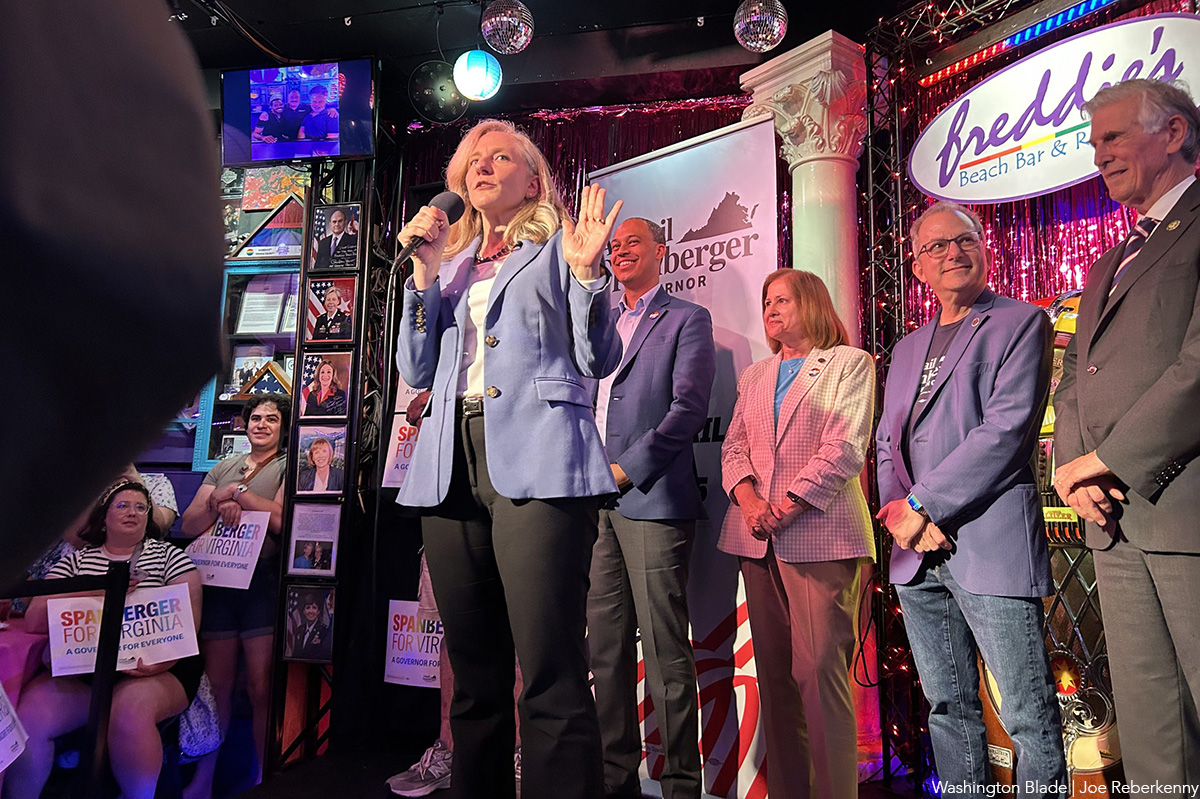
With the general election heating up and LGBTQ rights under increasing threat nationwide, Virginia gubernatorial candidate Abigail Spanberger brought her “Span Virginia Bus Tour” to Arlington’s Freddie’s Beach Bar for a campaign stop filled with cheers, policy pledges, and community spirit.
Spanberger, who served three terms in the U.S. House of Representatives from 2019 through early 2025 for Virginia’s 7th Congressional District, also served as a federal law enforcement officer specializing in narcotics and money laundering cases, and as a CIA case officer working on counterterrorism and nuclear counterproliferation.
Spanberger is running against Republican nominee Winsome Earle-Sears, the current lieutenant governor of Virginia, who said she was “morally opposed” to a bill protecting marriage equality in the commonwealth.
She was joined by other Democratic candidates and supporters: lieutenant gubernatorial candidate Ghazala Hashmi, attorney general candidate Jay Jones, Virginia state Sen. Adam Ebbin (D-Alexandria), and Congressman Don Beyer.
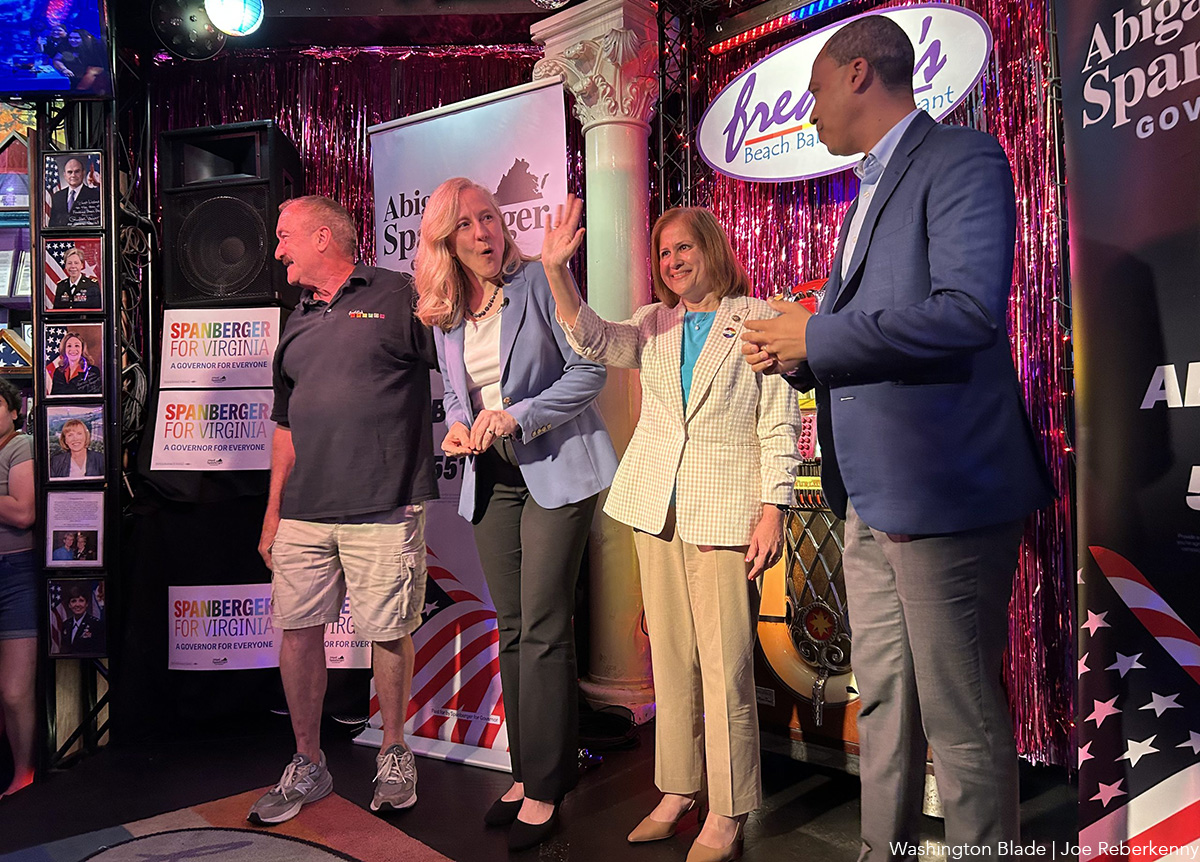
Freddie’s was packed wall-to-wall with supporters, many of whom wore “Spanberger for Virginia” shirts in the progressive Pride flag colors. In her speech, she made it clear that LGBTQ Virginians’ rights are on the ballot this year.
“I’m so excited to be here, and I am so grateful to the entire staff of Freddy’s for letting us overtake this incredible venue that is not just an awesome place to come together in community, but is a symbol to so many people of joy, of happiness, of community and of celebrating our friends and our neighbors,” Spanberger told the packed restaurant. “It is exciting to be here, and particularly during this Pride month, and particularly as we reflect on the 10-year anniversary of Obergefell and the reality that we still have so much work to do.”
“The reality is there are so many people who still would be inclined to take us backwards,” she said. “In this moment when we see attacks on people’s rights, on people’s humanity, on Virginia, on our economy, on research, on public education, on food security, on health care, on Virginians, on their jobs, on public service and on people — it can get heavy.”
“What it does for me is it makes me want to double down, because once upon a time, when I was talking to my mother about some horror show or sequence of activities coming out of a particular administration, she did not really have the patience to listen to me and said ‘Abigail, let your rage fuel you’ — and the conversation was over. And so I reflect on that, because, in fact, every day there is so much fuel to be had in this world and in this moment.”
One of the points Spanberger continued to emphasize was the importance of steadfast state government officials following the election of President Donald Trump, which has led to rollbacks of LGBTQ and bodily autonomy rights as a result of the conservative-majority U.S. Supreme Court.
“What the past few years have shown us is that a Supreme Court decision, no matter how many years we have celebrated its existence, does not protect us in the long term. And so as governor, I will work to make sure that every protection we can put in place for the dignity, the value, and the equal rights of all Virginians is a priority.”
During her speech, Spanberger highlighted several of the key values driving her campaign — protecting reproductive freedom and human rights, lowering healthcare costs, safeguarding Virginia’s environment, and ensuring that public education is affordable, accessible, and rooted in truth, not politics.
Spanberger went as far as to say that she wants to amend the state’s constitution to remove Section 15-A. “The reality is that in Virginia, we still have a ban in our state constitution on marriage equality. It is of the utmost urgency that we move forward with our constitutional amendment.”
“We will work to ensure that that terrible constitutional amendment, that was put in years ago, is taken out and updated and ensuring that Virginia is reflective in our most essential documents of who we are as a commonwealth, which is an accepting place that celebrates the vibrancy of every single person and recognizes that all Virginians have a place, both in that constitution and in law,” she added.
Following the event, two supporters spoke to the Washington Blade about why they had come out to support Spanberger.
“I came out because I needed to show support for this ticket, because it has been a particularly rough week, but a long few years for our rights in this country, in this state, with this governor, and it’s — we need to flip it around, because queer people need protection,” said Samantha Perez, who lives in Ballston. “Trans people need protection. Trans kids need protection. And it’s not gonna happen with who’s in Richmond right now, and we just need to get it turned around.”
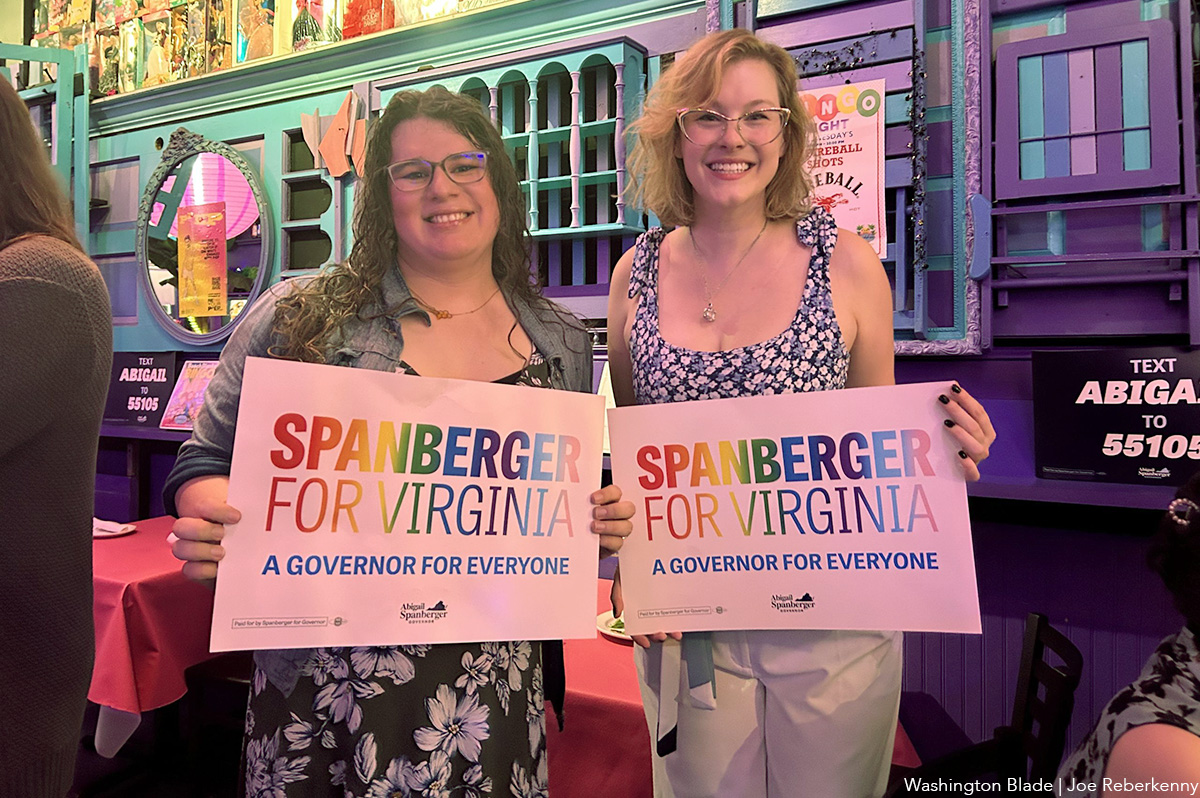
“The whole neighborhood’s here. All our friends are here,” said Annie Styles of Pentagon City. “It means the world to me to take care of each other. That’s what a good community does. That’s not what we’ve had with the Republicans here or across the nation for a really long time. It’s time to show that care. It’s time to make sure that good people are in a position to do good things.”
District of Columbia
Activists protest outside Hungarian Embassy in DC
Budapest Pride scheduled to take place Saturday, despite ban

More than two dozen activists gathered in front of the Hungarian Embassy in D.C. on Friday to protest the country’s ban on Budapest Pride and other LGBTQ-specific events.
Amnesty International USA Executive Director Paul O’Brien read a letter that Dávid Vig, executive director of Amnesty International Hungary, wrote.
“For 30 years Budapest Pride has been a celebration of hope, courage, and love,” said Vig in the letter that O’Brien read. “Each march through the streets of Budapest has been a powerful testament to the resilience of those who dare to demand equality, but a new law threatens to erase Pride and silence everyone who demands equal rights for LGBTI people.”
“The Hungarian government’s relentless campaign against LGBTI rights represents a worrying trend that can spread normalizing division and hatred,” added Vig. “Thank you for standing with us when we refuse to be intimidated.”
Council for Global Equality Chair Mark Bromley and two of his colleagues — Stephen Leonelli and Keifer Buckingham — also spoke. Health GAP Executive Director Asia Russell and Chloe Schwenke, a political appointee in the Obama-Biden administration who worked for the U.S. Agency for International Development, and Planned Parenthood staffers are among those who attended the protest.
(Washington Blade video by Michael K. Lavers)
Hungarian lawmakers in March passed a bill that bans Pride events and allow authorities to use facial recognition technology to identify those who participate in them. MPs in April amended the Hungarian constitution to ban public LGBTQ events.
Budapest Pride is scheduled to take place on Saturday, despite the ban. Hundreds of European lawmakers are expected to participate.
“Sending strength to the patriotic Hungarians marching tomorrow to advance human dignity and fundamental rights in a country they love,” said David Pressman, the gay former U.S. Ambassador to Hungary, on Friday on social media.
Sending strength to the patriotic Hungarians marching tomorrow to advance human dignity and fundamental rights in a country they love. Szabadság és szerelem. My past remarks on Budapest Pride: https://t.co/y1QhA9QouA
— David Pressman (@AmbPressman) June 27, 2025
-

 U.S. Supreme Court4 days ago
U.S. Supreme Court4 days agoSupreme Court upholds ACA rule that makes PrEP, other preventative care free
-

 U.S. Supreme Court4 days ago
U.S. Supreme Court4 days agoSupreme Court rules parents must have option to opt children out of LGBTQ-specific lessons
-

 National5 days ago
National5 days agoEvan Wolfson on the 10-year legacy of marriage equality
-

 Congress5 days ago
Congress5 days agoSenate parliamentarian orders removal of gender-affirming care ban from GOP reconciliation bill

